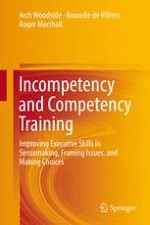
2016 | OriginalPaper | Chapter
1. Foundations for Theory and Practice of Competence and Incompetence Training
Authors : Arch Woodside, Rouxelle de Villiers, Roger Marshall
Published in: Incompetency and Competency Training
Publisher: Springer International Publishing
Activate our intelligent search to find suitable subject content or patents.
Select sections of text to find matching patents with Artificial Intelligence. powered by
Select sections of text to find additional relevant content using AI-assisted search. powered by